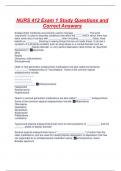NURS 412 Exam 1 Study Questions and
Correct Answers
Antipsychotic medicines are primarily used to manage ___________. The word
"psychosis" is used to describe conditions that affect the ____, and in which there has
been some loss of contact with _________, often including __________ (false, fixed
beliefs) or _________ (hearing or seeing things that are not really there). It can be a
symptom of a physical condition such as drug abuse or a mental disorder such as
____________, bipolar disorder, or very severe depression (also known as "psychotic
depression"). ✅psychosis
Mind
Reality
Delusions, hallucinations
Schizophrenia
Older or first-generation antipsychotic medications are also called conventional
"_________" antipsychotics or "neuroleptics". Some of the common typical
antipsychotics include:
______________
____________
_____________
_______________ ✅Chlorpromazine
Haloperidol
Perphenazine
Fluphenazine
Newer or second generation medications are also called "__________" antipsychotics.
Some of the common atypical antipsychotics include: ✅Risperidone
Olanzapine
Quetiapine
Ziprasidone
Aripiprazole
Paliperidone
Lurasidone
Typical and atypical antipsychotics both work to treat symptoms of __________ and the
_______ phase of bipolar disorder.
Several atypical antipsychotics have a "_________ ___________" of action than the
older medications, and are used for treating bipolar depression or depression that has
not responded to an antidepressant medication alone. ✅schizophrenia, manic
Broader spectrum
,Certain symptoms, such as feeling _________ and having ____________, usually go
away within days of starting an antipsychotic medication. Symptoms like __________
usually go away within a few weeks, but the full effects of the medication may not be
seen for up to ______ weeks.
When a doctor says it is okay to stop taking a medication, it should be gradually
_________ off— never ________ suddenly. Many people must stay on an antipsychotic
continuously for months or years in order to stay well; treatment should be
___________ for each individual. ✅agitated
Hallucinations
Delusions
6
Tapered
Stopped
Individualized
Side effects of antipsychotic medicines:
- __________
- ___________
- Restlessness
- Weight _________ (the risk is higher with some _________ antipsychotic medicines)
- ____ mouth
- ___________
- N/V
- Blurred vision
- Low______
- Uncontrollable movements, such as tics and ___________ (the risk is higher with
__________ antipsychotic medicines)
- ___________
- A low number of _____, which fight infections
A person taking an atypical antipsychotic medication should have his or her ________,
___________ levels, and ___________ levels monitored regularly by a doctor.
Typical antipsychotic medications can also cause additional side effects related to
physical movement, such as:
- ___________
- Persistent muscle _________
-Tremors
-Restlessness
Long-term use of ________antipsychotic medications may lead to a condition called
tardive dyskinesia (TD). TD causes muscle _________, commonly around the
_________, that a pers ✅drowsiness
Dizziness
,Gain, atypical
Dry
Constipation
BP
Tremors, typical
Seizures
WBC
Weight, glucose, lipids
Rigidity
Spasms
Typical
Movements
Mouth, control
Atypical
Mood stabilizers are used primarily to treat _________ _______, _______ _________
associated with other mental disorders, and in some cases, to augment the effect of
other medications used to treat depression.
___________, which is an effective mood stabilizer, is approved for the treatment of
mania and the maintenance treatment of bipolar disorder.
Mood stabilizers work by decreasing _________ activity in the brain and are also
sometimes used to treat:
-_____________ (usually along with an antidepressant)
- Schizo___________ Disorder
- Disorders of impulse control
- Certain mental illnesses in children
_____________ medications are also used as mood stabilizers. They were originally
developed to treat ___________, but they were found to help control unstable moods as
well. One anticonvulsant commonly used as a mood stabilizer is __________
__________ (also called divalproex sodium). For some people, especially t ✅bipolar
disorder, mood swings
Lithium
Abnormal
Depression
Affective
Anticonvulsants
Seizures
Valproic acid
Lithium
, Carbamazepine
Mood stabilizers side effects include:
- __________, rash
- Excessive _____
- Frequent ___________
Tremor (shakiness) of the ______
Nausea and vomiting
- __________speech
- Fast, slow, irregular, or pounding _______-
- Blackouts
- Changes in vision
- Seizures
- _____________ (seeing things or hearing voices that do not exist)
- Loss of coordination
- _________ of the eyes, face, lips, tongue, throat, hands, feet, ankles, or lower legs.
✅itching
Thirst
Urination
Hands
Slurred
HR
Hallucinations
Swelling
If a person with bipolar disorder is being treated with lithium, he or she should visit the
doctor regularly to check the lithium levels his or her _____, and make sure the ______
and the _________ are working normally.
Lithium is eliminated from the body through the __________, so the dose may need to
be __________ in older people with reduced kidney function. Also, loss of water from
the body, such as through sweating or diarrhea, can cause the lithium level to___,
requiring a temporary ____________ of the daily dose. Although kidney functions are
checked periodically during lithium treatment, actual damage of the kidney is
uncommon in people whose blood levels of lithium have stayed within the therapeutic
range. ✅blood, kidney, thyroid
Kidney
Lowered
Rise
Lowering
Anticonvulsant medications may also:
-Cause damage to the __________ or ___________, so people taking it should see
their doctors regularly




